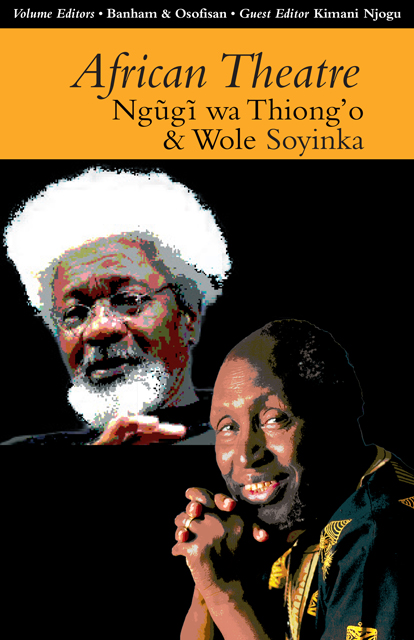Book contents
- Frontmatter
- Contents
- Notes on Contributors
- Obituary of Pat Amadu Maddy
- Introduction
- Reading & Performing African Drama: How Wole Soyinka & Ngũgĩ wa Thiong’o influenced my work
- Ayan Contra Ujamaa: Soyinka & Ngũgĩ as theatre theorists
- Encounters with Soyinka
- Encounters with Ngugi
- Wole Soyinka & Ngũgĩ wa Thiong’o: Plays in Production
- The Making of The Trial of Dedan Kĩmathi by Ngũgĩ wa Thiong’o & Mĩcere Gĩthae Mũgo at the University of California, Irvine: A personal reflection
- Playscript: A Rain of Stones
- Book Reviews
III - Ngũgĩ wa Thiong’o: The unrecognized Black Hermit
Published online by Cambridge University Press: 23 February 2023
- Frontmatter
- Contents
- Notes on Contributors
- Obituary of Pat Amadu Maddy
- Introduction
- Reading & Performing African Drama: How Wole Soyinka & Ngũgĩ wa Thiong’o influenced my work
- Ayan Contra Ujamaa: Soyinka & Ngũgĩ as theatre theorists
- Encounters with Soyinka
- Encounters with Ngugi
- Wole Soyinka & Ngũgĩ wa Thiong’o: Plays in Production
- The Making of The Trial of Dedan Kĩmathi by Ngũgĩ wa Thiong’o & Mĩcere Gĩthae Mũgo at the University of California, Irvine: A personal reflection
- Playscript: A Rain of Stones
- Book Reviews
Summary
One could easily argue that Ngũgĩ is one of Kenya’s most significant cultural exports. Over half a century, he has penned celebrated plays, novels, essays and has been fêted all over the world. His books are translated into over thirty languages. Ngũgĩ wa Thiong’o has been honoured with countless awards as well as honorary doctorate degrees. In his motherland, he remains the proverbial unaccepted prophet. His detention and subsequent flight from Kenya to escape political persecution made him more famous, or infamous. At the height of the political intolerance of Moi’s autocratic regime, Ngũgĩ was a pariah in his homeland. Many of his works had been banned by the government of the day, with novels that had for a long while been English literature set-books in high school, like The River Between and A Grain of Wheat, pulled out of the national school curriculum. Following the razing to the ground of his Lĩmuru based Kamĩrĩĩthũ Theatre, associated with his plays I Will Marry When I Want (Ngahiika Ndeenda) and Mother Sing for Me (Maitũ Njugĩra), producers actively avoided his plays. The state’s displeasure with Ngũgĩ and his writing was obvious and the intimidation of those who tried to revive the ‘spirit’ of Ngũgĩ or that of Kamĩrĩĩthũ was loud and clear: one produced an Ngũgĩ play at one’s own risk.
In 1988, the Daniel arap Moi regime supported national celebrations all over Kenya to mark ten years of the president’s rule; an enterprise that was dubbed The Nyayo Era Celebrations. The Free Travelling Theatre of the University of Nairobi with which Ngũgĩ had been associated at its inception chose to perform Wole Soyinka’s Kongi’s Harvest under the direction of Gachũgũ Makini. Makini had been a cast member in the 1977 World Black Festival of Arts and Culture (FESTAC) production of The Trial of Dedan Kĩmathi, and was also involved in the Maitũ Njugĩra production. The irony of this choice was lost on the organizing committee of the celebrations until someone from the Literature Department at the University of Nairobi pointed it out. The show was a satirical mockery of what had popularly gained the moniker, Nyayo Errors. The national celebration committee allegedly demanded an explanation as to why the university troupe had chosen a ‘foreign’ play to be mounted during celebration of a uniquely Kenyan event.
- Type
- Chapter
- Information
- African Theatre 13Ngugi wa Thiong'o and Wole Soyinka, pp. 48 - 52Publisher: Boydell & BrewerPrint publication year: 2014



